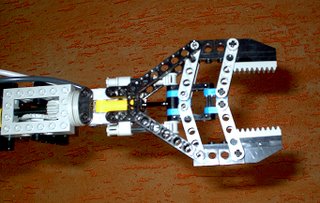
Hi Guys!
We are back to the grind on Monday. Our latest objective in our Lego Robotics Talent Class is to build a simple grasping claw. Claws are needed to do work. A robot that has the ability to grasp objects makes it a versatile robot and will have the ability to score points in many competitions.
Before the break, we were building the claw on a separate chassis. That means we were not using an RCX yet. Yes, eventually we will attach the claw, but for now, each work group is busy constructing the claws as a unique item.
I showed you two examples of grasping claws, one was an expanding scissor-like claw and the other was a pivoting claw.
We found that we need to follow a few principles to build a successful claw:
1.) A claw needs a structure-- like a rectangular frame. By the end of the week we were calling it a "chassis." That helped students to get the idea across that the claw needs to be supported just as gear trains, axles and wheels do.
2.) "Trial and Error" seems to be a good way to build a claw. Drawing and planning are always appreciated but nothing beats building, testing and re-building.
Think of heavy machinery. Can you think of any machines or devices that have grasping claws? Try drawing that object.
One last thought. Building this claw is very rich activity to learn from. I want to see diagrams and drawings in your Robotics Journals. I want to see descriptions of your processes. I want to read what you think. I want to read how you solved problems with your claw.




6 comments:
Does the claw on the top use a pneumatic pump?
Did you make that grabber arm?
Before I saw the claw in the Claw Lesson from MIT link I didn't even think that a claw could be so elaborate with so many gears and beams. What are the claw anolog postion sensor and claw all-the-way-open limit switch that they talk about in the link?
-Robert 719-
Robert, Wilson,
I do not think the pump runs the claw.
I did not make the claw shown.
The claw limit switch tells the OPENING command to stop at the apex or outer limit of its opening range. The analog sonsor means "not digital." So it could be a touch or rotation that counts an actual physical bump or touch.
Honestly, I had a hard time finding pictures of simple grasping claws on the web.
Most of the claws or arm that I found were very complex. Some were so fantastic that I did not want to post them because I want my students to concentrate on building a rock-solid claw that works flawlessly. Later, once the basics have been mastered, groups can build more complex claws and arms.
I am really glad you take the time to investigate the links and resources I provide.
Good work fellas.
yo wassap
its meeeeeeeeee
sterling is back to complain
y didnt we get to have penuematics(that could be spelled wrong and im too lazy to go check)
if i had the what-cha-ma-call-its back then i'd make something cool wit it other than just a wanna be fancy claw
man i would go crazy with that thing
P.S.
if u want to comment my comment u can email me at radchad84@yahoo.com
dont ask y its chad even tho my name isnt chad
P.P.S.
wasssap!!!!
and i do have the yadi-yadi-yada
at home OHHHHHHHHHHH!!!!!!!
:)
Post a Comment